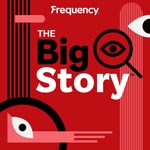The Deep Dive from The Walrus – Details, episodes & analysis
Podcast details
Technical and general information from the podcast's RSS feed.

The Deep Dive from The Walrus
The Walrus
Frequency: 1 episode/8d. Total Eps: 22

The Deep Dive is a weekly podcast that goes deeper into everything we're working on at The Walrus. Tune in to hear from writers, talkers, illustrators, editors, and other contributors to the thought-provoking journalism, art, and events we create.
Recent rankings
Latest chart positions across Apple Podcasts and Spotify rankings.
Apple Podcasts
🇨🇦 Canada - newsCommentary
07/07/2025#84🇨🇦 Canada - newsCommentary
05/07/2025#82🇨🇦 Canada - newsCommentary
03/07/2025#65🇨🇦 Canada - newsCommentary
02/07/2025#80🇨🇦 Canada - newsCommentary
22/05/2025#90🇨🇦 Canada - newsCommentary
20/05/2025#91🇨🇦 Canada - newsCommentary
15/05/2025#95🇨🇦 Canada - newsCommentary
05/03/2025#93🇨🇦 Canada - newsCommentary
04/03/2025#90🇨🇦 Canada - newsCommentary
27/02/2025#90
Spotify
No recent rankings available
Shared links between episodes and podcasts
Links found in episode descriptions and other podcasts that share them.
See allRSS feed quality and score
Technical evaluation of the podcast's RSS feed quality and structure.
See allScore global : 78%
Publication history
Monthly episode publishing history over the past years.
Essays on Lip Service
Episode 3
jeudi 9 juin 2022 • Duration 15:24
Two former voices from The Walrus—Tajja Isen, the former digital editor, now editor-in-chief at Catapult magazine, and digital director Angela Misri, who by the time this episode is available will have moved on to Toronto Metropolitan University as its newest assistant professor.
Misri talked to Isen about her new book, Some of my Best Friends: Essays on Lip Service. It’s an essay collection about race, justice, and the limits of good intentions.
Tajja Isen is also the co-editor of the essay anthology The World As We Knew It: Dispatches from a Changing Climate. Some of My Best Friends is her debut essay collection. Angela Misri is a novelist and digital journalist based in Toronto.
In this episode:Isen describes why she wrote this book and the journey she marked through writing it.
Then Isen talks about the baggage people bring to the books they read and how she approached writing the nine essays in the collection.
Isen then describes the toughest and easiest chapters to write and why absolution is a theme that shows up throughout.
Isen also talks about the publishing industry and fighting the impulse to pigeonhole a book on a shelf or genre that is more than one thing.
Finally, Isen gives some advice for new writers.
Links:This episode of The Deep Dive was produced by Simran Singh, Yasmin Duale, and Angela Misri and edited by Angela Misri. Thanks so much toTajja Isen for joining us this week.
Music for this podcast is provided by Audio Jungle. Our theme song is “This Podcast Theme” by Inplus Music. Additional music includes “Ethereal Relaxation” by Kevin MacLeod.
Ethereal Relaxation by Kevin MacLeod
Link: https://incompetech.filmmusic.io/song/8719-ethereal-relaxation
License: https://filmmusic.io/standard-license
How Did Credit Scores Become So Powerful?
Season 1 · Episode 20
jeudi 2 juin 2022 • Duration 18:12
Credit scores are often the deciding factor for people’s most important financial milestones. Whether it’s getting approved for a mortgage, buying a car, or getting a loan, those three digits can make or break a person’s life.
But what might surprise you is that finding errors in your credit score is extremely common, and trying to fix it brings a whole other set of issues.
In this episode:We hear from award-winning journalist Emily Baron Cadloff, who wrote the cover story of the June issue of The Walrus.
She explains how credit scores have grown to hold so much power over our lives.
Baron Cadloff then debunks some popular misconceptions about credit scores and talks about how common credit-score errors are and how to avoid them.
Finally, Baron Cadloff breaks down the main takeaways from her latest piece.
Links:
- How Credit Scores Can Run—and Ruin—Our Lives
- Canada’s Middle Class Is on the Brink of Ruin
- Owning Our Privilege
Credits:
This week’s episode was produced and edited by Yasmin Duale and Simran Singh. Thanks so much to Emily Baron Cadloff for joining us.
Music Credits:
“Impact Prelude” by Kevin MacLeod
Link: incompetech.filmmusic.io/song/7565-impact-prelude
License: filmmusic.io/standard-license
“Inspired” by Kevin MacLeod
Link: incompetech.filmmusic.io/song/3918-inspired
License: filmmusic.io/standard-license
Why Are People Getting Deported During a Pandemic?
Season 1 · Episode 11
jeudi 31 mars 2022 • Duration 19:28
Why Are People Getting Deported During a Pandemic?
Season 1, Episode 11
When the World Health Organization declared COVID-19 a pandemic, Canada announced the suspension of most deportations. Then, despite its own advisories warning that international travel during a pandemic is a major risk, Ottawa lifted its moratorium on deportations in late November 2020. The federal government has since deported thousands of people during the pandemic.
Isabel Macdonald is an independent journalist and researcher living in Montreal. She spoke with public health experts and asylum seekers to examine why these deportations are happening and the added dangers of doing them in the time of COVID-19.
In this episode:Macdonald talks about how Canada justifies deporting people during a pandemic.
She then goes over the numbers of how many people are getting deported and explains why this data is difficult to access.
Macdonald then breaks down the statistics to explain which nationalities have been deported most during the pandemic.
Then she goes into the case of Jatinder Singh, a truck driver who was deported to India during the pandemic.
She explains why Singh had been seeking asylum in Canada in the first place and how difficult it can be to claim asylum in Canada generally.
And then she discusses the harm done by deporting people during a pandemic.
Macdonald then shares what she is currently reading right now.
Finally, we check in on what we're talking about this week at The Walrus.
Links:Additional Links:Facebook @thewalrus
Twitter @thewalrus
Instagram @thewalrus
Looking to get in touch about the podcast? You can reach us at web@thewalrus.ca.
Credits:Hosted and produced by Sheena Rossiter and Angela Misri, with editing by Sheena Rossiter
Music provided by Audio Jungle. Our theme song is “This Podcast Theme” by Inplus Music Additional music: “Stay Cool” by Loops Lab; “Podcast Intro” by Inplus Music; “Leaving Home,” “With Regards,” and “Inspired” by Kevin MacLeod, provided by Film Music; and “Skydancer” by Scandinavian.
With Regards by Kevin MacLeod
Link: https://incompetech.filmmusic.io/song/4636-with-regards
License: https://filmmusic.io/standard-license
Inspired by Kevin MacLeod
Link: https://incompetech.filmmusic.io/song/3918-inspired
License: https://filmmusic.io/standard-license
Leaving Home by Kevin MacLeod
Link: https://incompetech.filmmusic.io/song/4708-leaving-home
License: https://filmmusic.io/standard-license
Heather O’Neill on Women’s Relationship with Food
Season 1 · Episode 10
jeudi 24 mars 2022 • Duration 24:04
Season 1, Episode 10
Have you ever noticed that there is an inordinate amount of sweets in films directed by women? Writer Heather O’Neill has. In her latest essay for The Walrus, “Let Her Eat Cake: The Subversive Power of Women Feasting,” she delves into the world of women indulging to explore this fixation on sweet treats.
Through a series of personal vignettes, O’Neill weaves the story of her own relationship with food into her analysis of feast-focused films both contemporary and classic.
Heather O'Neill is an award-winning novelist and essayist. Her works include Lullabies for Little Criminals and The Lonely Hearts Hotel. Her most recent novel is When We Lost Our Heads.
In this episode:O’Neill explains what inspired her to write an essay about women feasting.
She then talks about why she chose these particular films to focus on.
She then discusses what food has meant in her own life and how her relationship with food changed once she moved out and grew into adulthood.
Then O’Neill speaks about the problematic diets and trends of the 1990s, when “Heroin Chic” was all the rage.
O’Neill then talks about how popular culture has since shifted, with the recent body positivity movement, but how women still have trouble accepting their own bodies.
She then speaks about eating at food banks with her young daughter when she was in her early twenties.
O’Neill then discusses what food means to women’s lives.
We then hear about what O’Neill is reading right now.
Finally, we check in on what we're talking about this week at The Walrus.
Links:Additional Links:- Nicholas Hune-Brown Wins 2022 Canadian Hillman Prize for Journalism
- Emily Baron Cadloff’s TikTok video
- Viral Symptoms: The Rise of Mental Health Diagnosis Videos on TikTok
Facebook @thewalrus
Twitter @thewalrus
Instagram @thewalrus
Looking to get in touch about the podcast? You can reach us at web@thewalrus.ca.
Credits:Hosted and produced by Sheena Rossiter and Angela Misri, with editing by Sheena Rossiter
Music provided by Audio Jungle. Our theme song is “This Podcast Theme” by Inplus Music Additional music: “Stay Cool” by Loops Lab; “Podcast Intro” by Inplus Music; “Protofunk” and “Private Reflection” by Kevin MacLeod, provided by Film Music; “Skydancer” by Scandinavianz; “Dark Eyes” by Teddy and Marge, provided by the Free Music Archive.
Private Reflection by Kevin MacLeod
Link: https://incompetech.filmmusic.io/song/4241-private-reflection
License: https://filmmusic.io/standard-license
Protofunk by Kevin MacLeod
Link: https://incompetech.filmmusic.io/song/4247-protofunk
License: https://filmmusic.io/standard-license
Additional sources: Fellinious, Masguita, and ABC News on YouTube
COVID-19 Two Years On
Season 1 · Episode 9
jeudi 17 mars 2022 • Duration 22:30
COVID-19 Two Years On
Season 1, Episode 9
It was a moment that most people won’t forget any time soon. Just over two years ago, COVID-19 was declared a pandemic. It was on March 11, 2020, when Tedros Adhanom Ghebreyesus, the director general of the World Health Organization, took to the microphone at a press conference in Geneva to make this declaration—saying that this was the first time a coronavirus had sparked a pandemic.
Most of us were stunned, and our lives would be forever changed. The world seemingly went into lockdown overnight, masks and hand sanitizer became common accessories in most households, and the term social distancing became part of our vocabulary. Now, two years into the pandemic, many of us are still wondering: When will it end?
This week, we’ll be speaking with Dan Werb, an award-winning writer and epidemiologist whose work has appeared in the New York Times, Salon, The Believer, and The Walrus, among other places. His latest book, The Invisible Siege: The Rise of Coronaviruses and the Search for a Cure, chronicles the emergence of coronavirus science across multiple epidemics. And we recently ran an excerpt of it at thewalrus.ca.
In this episode:Werb talks about how long this pandemic is expected to last (and whether it will ever end).
Werb then talks about global vaccine inequity.
He then explains why he decided to write a book about the history of human coronaviruses and how scientists have studied them and tried to stop them.
He then talks about the scientists who have been researching coronaviruses for decades and how they have come to the forefront of popular culture during this pandemic.
Then, he speaks about the danger of the COVID-19 misinformation that has been spreading during this pandemic.
And he explains the market incentives to create vaccines and the importance of funding public science.
Werb then shares what he is currently reading right now.
Finally, we check in on what we're talking about this week at The Walrus.
Links:Additional Links:- Ask a Refugee Expert: How Will War in Ukraine Impact Immigration?
- The Walrus Leadership Forum: Technology and Treatment
- The Walrus Talks at Home: Youth and the Climate Crisis
Facebook @thewalrus
Twitter @thewalrus
Instagram @thewalrus
Looking to get in touch about the podcast? You can reach us at web@thewalrus.ca.
Credits:Hosted and produced by Sheena Rossiter and Angela Misri, with editing by Sheena Rossiter
Music provided by Audio Jungle. Our theme song is “This Podcast Theme” by Inplus Music Additional music: “Stay Cool” by Loops Lab; “Podcast Intro” by Inplus Music; “Ethereal Relaxation,” “Impact Prelude,” and “Screen Saver” by Kevin MacLeod, provided by Film Music.
Impact Prelude by Kevin MacLeod
Link: https://incompetech.filmmusic.io/song/7565-impact-prelude
License: https://filmmusic.io/standard-license
Screen Saver by Kevin MacLeod
Link: https://incompetech.filmmusic.io/song/5715-screen-saver
License: https://filmmusic.io/standard-license
Ethereal Relaxation by Kevin MacLeod
Link: https://incompetech.filmmusic.io/song/8719-ethereal-relaxation
License: https://filmmusic.io/standard-license
Additional sources: Global News, The World Health Organization, and Late Night with Seth Meyers on YouTube.
The Tangled Politics Keeping a Uyghur Man in Limbo
Season 1 · Episode 8
jeudi 10 mars 2022 • Duration 20:02
The Tangled Politics Keeping a Uyghur Man in Limbo
Season 1, Episode 8
This week we’ll hear from Annie Hylton. For the March/April issue of The Walrus, Hylton takes a look at the complex case of Ayoob Mohammed.
Mohammed is Uyghur—a largely Muslim, Turkic-speaking ethnic group that has faced persecution in China. Recently, Canada’s Parliament labelled China’s treatment of Uyghurs “genocide.”
While escaping from China in 2001, Mohammed found himself in Afghanistan on the eve of 9/11. In the chaos that ensued, he was sold for bounty to US forces and sent to Guantánamo Bay.
US officials maintained that Mohammed was a member of the Eastern Turkistan Independence Movement, allegedly a Uyghur terrorist group, though this may have been part of an attempt to secure China’s support for the war on terror.
Hylton takes listeners through Mohammed’s long journey from his birthplace in China to Guantánamo Bay to Albania, where he remains after two rejected attempts to join his family in Canada.
Hylton is an independent investigative journalist and writer from Saskatchewan who is now based in Paris, where she is an associate professor at Sciences Po. She won a gold National Magazine Award for her 2020 long-form feature “Searching for Mackie,” which was published in The Walrus.
In this episode:We hear Hylton discuss Uyghur culture and the persecution the group has faced in China.
Hylton talks about Ayoob Mohammed and his early life in Xinjiang.
She then explains how 9/11 threw the region into turmoil and led to Mohammed being imprisoned at Guantánamo Bay.
She then talks about how she came across and reported Mohammed’s story.
Hylton then shares what she is currently watching right now.
Finally, we check in on what we're talking about this week at The Walrus.
Links:Additional Links:
- How can I help Ukraine? Resources and tips for Canadians
- Article Club
- My Son Peed Onscreen in a Zoom Call, and Other Tales of a Working Parent
Facebook @thewalrus
Twitter @thewalrus
Instagram @thewalrus
Looking to get in touch about the podcast? You can reach us at web@thewalrus.ca.
Credits:Hosted and produced by Sheena Rossiter and Angela Misri, with editing by Sheena Rossiter
Music provided by Audio Jungle. Our theme song is “This Podcast Theme” by Inplus Music Additional music: “Stay Cool” by Loops Lab; “Podcast Intro” by Inplus Music; “Lightless,” “Floating Cities,” “Shores of Avalon,” and “Comfortable Mystery” by Kevin MacLeod, provided by Film Music.
Lightless Dawn by Kevin MacLeod
Link: https://incompetech.filmmusic.io/song/3982-lightless-dawn
License: https://filmmusic.io/standard-license
Floating Cities by Kevin MacLeod
Link: https://incompetech.filmmusic.io/song/3765-floating-cities
License: https://filmmusic.io/standard-license
Shores of Avalon by Kevin MacLeod
Link: https://incompetech.filmmusic.io/song/4349-shores-of-avalon
License: https://filmmusic.io/standard-license
Comfortable Mystery by Kevin MacLeod
Link: https://incompetech.filmmusic.io/song/3531-comfortable-mystery
License: https://filmmusic.io/standard-license
Additional sources: Global News on YouTube.
How the Pandemic Has Changed the Bra
Season 1 · Episode 7
jeudi 3 mars 2022 • Duration 19:13
At the start of the COVID-19 pandemic, many predicted that the bra was fast-tracked for extinction. Instead, past styles were largely retired in favour of more comfortable options. What does the change mean?
From tight-laced corsets to push-ups, the idea that bras aren’t supposed to be comfortable has been around for over a century. But, as people increasingly dress for themselves, we’ve begun to reconsider the purpose of our undergarments.
This week on The Deep Dive, Sheena Rossiter speaks with writer Nicole Schmidt, an associate editor at The Walrus, about how the pandemic has changed the bra. Prior to joining The Walrus, Schmidt was an assistant editor at Toronto Life. She has written for Maclean's, the National Post, Yahoo, and Vice.
Toronto-based illustrator Kate Traynor also speaks about her illustration for this story. Traynor’s work has been featured in publications such as Broadview, Quill and Quire, and Reader's Digest.
In this episode:We hear why Schmidt wanted to work on a feature about how the pandemic has changed the bra.
We learn the full history of the bra: from its first appearance in ancient Greece to the corset to the WonderBra.
Schmidt then tells us about a popular TikTok challenge where women are cutting up their old padded bras to make bralettes, and some more new trends in bras.
She then talks about the rise in smaller and newer brands for women’s underwear during the pandemic.
Then we hear from Kate Traynor about her inspiration for the story’s illustration. She describes how she drew from her own experience with bras to arrive at the final illustration.
Finally, we check in on what we're talking about this week at The Walrus.
Links:Additional Links:- Chrystia Freeland Wants to Fix the Twenty-First Century
- Embedded with the .01 Percent
- How to Train a Ukrainian Soldier
Facebook @thewalrus
Twitter @thewalrus
Instagram @thewalrus
Looking to get in touch about the podcast? You can reach us at web@thewalrus.ca.
Credits:Hosted and produced by Sheena Rossiter and Angela Misri, with editing by Sheena Rossiter
Music provided by Audio Jungle. Our theme song is “This Podcast Theme” by Inplus Music Additional music: “Stay Cool” by Loops Lab; “Podcast Intro” by Inplus Music; and “Investigations” and “Umbrella Pants” by Kevin MacLeod, provided by Film Music.
Investigations by Kevin MacLeod
Link: https://incompetech.filmmusic.io/song/3924-investigations
License: https://filmmusic.io/standard-license
Umbrella Pants by Kevin MacLeod
Link: https://incompetech.filmmusic.io/song/4559-umbrella-pants
License: https://filmmusic.io/standard-license
Additional Sources: Marsonfurs, Micheal Levy, and “Rosie the Riveter” by the Four Vagabonds from Glamour Daze on YouTube.
Correction March 3, 2022: This interview references an NPR article which stated that 28,000 pounds of steel—enough to build two battleships—were saved after women were asked to stop buying corsets during the First World War. In fact, 28,000 tons of steel were saved, enough to build at least one battleship. The Walrus regrets the errors.
Confessions of a Bitcoin Widow
Season 1 · Episode 6
jeudi 24 février 2022 • Duration 23:32
Jennifer Robertson met her husband, Bitcoin entrepreneur Gerald Cotten, on Tinder. As their relationship flourished, so did Cotten’s company, QuadrigaCX, and the twentysomethings soon became wealthy beyond their wildest dreams.
Then, at age thirty, Cotten suddenly died. Overnight, their dream life became Robertson’s worst nightmare. Cotten possessed the only keys to the online vaults where his customers’ investments were supposedly stored.
No one knew where to find $215 million belonging to more than 76,000 investors. “Part of me felt as though our life together had been a dream, the best dream you could ever imagine, and now it was time to wake up," says Robertson. "But to what?"
This week, Sheena Rossiter is in conversation with Jennifer Robertson. Robertson is a former HR specialist and property manager whose life was turned upside down in the Quadriga scandal. And, in her new book with journalist Stephen Kimber, Bitcoin Widow: Love, Betrayal and the Missing Millions, she shares her side of the story for the first time.
In this episode:We hear how Jennifer Robertson met Gerald Cotten, the founder of QuadrigaCX, and what their life together was like before Cotten died.
We learn how Robertson was kept in the dark about what was happening inside Quadriga.
Robertson then explains how Cotten died in India and why she waited a month to announce his death.
She then talks about how her life has changed since Cotten’s death and how she feels like a scapegoat in the scandal.
Then Robertson speaks about why she decided to write her book and whether she thinks the Quadriga debacle will follow her for the rest of her life.
Finally, we check in on what we're talking about this week at The Walrus.
Links:Additional Links:- North Korea’s Mysterious Cryptocurrency Ambitions
- Will Cryptocurrency Be Alberta’s Next Big Boom?
- Is Canada Broken?
Facebook @thewalrus
Twitter @thewalrus
Instagram @thewalrus
Looking to get in touch about the podcast? You can reach us at web@thewalrus.ca.
Credits:Hosted and produced by Sheena Rossiter and Angela Misri, with editing by Sheena Rossiter
Music provided by Audio Jungle. Our theme song is “This Podcast Theme” by Inplus Music Additional music: “Stay Cool” by Loops Lab and “Podcast Intro” by Inplus Music. “Moment” by Serge Quadrado, “Piano Moment” by Zakhar Valaha, provided by Pixabay.
Additional Sources: CBC and CTV
How to Save Dying Gay Bars
Season 1 · Episode 5
jeudi 17 février 2022 • Duration 20:49
The COVID-19 pandemic has been a difficult time for bars and nightclubs, many of which have had to shutter. But it’s been especially hard for gay bars, which have acted as safe spaces for the queer community for decades.
Gay bars have been suffering a slow, drawn-out death for years. Skyrocketing rental prices, diminished interest, and a shrinking economy have forced many queer spaces—including some legendary historic ones—to call it quits.
This week, Angela Misri speaks with writer KC Hoard, whose work has appeared in the Globe and Mail, the National Post, Broadview Magazine, CBC Arts, and Xtra Magazine. And Sheena Rossiter speaks with Tim Singleton, an artist, designer, and illustrator from Toronto whose work has appeared in the Washington Post, HuffPost, Adweek, and more.
In this episode:We hear how important gay bars are to the queer community.
We learn how gay bars have acted as safe spaces from which queer communities can flourish.
KC Hoard explains why these bars are starting to die off.
We learn about other queer community spaces that have popped up during the COVID-19 pandemic and some potential solutions to the crisis facing queer spaces.
Then Sheena Rossiter speaks with Tim Singleton, who illustrated KC Hoard’s story on the decline of gay bars.
Finally, we check in on what we're talking about this week at The Walrus.
Links:Additional Links:- Hope You’re Well.
- Objectivity Is a Privilege Afforded to White Journalists
- The Walrus Wins Gold at the Canadian Online Publishing Awards
Facebook @thewalrus
Twitter @thewalrus
Instagram @thewalrus
Looking to get in touch about the podcast? You can reach us at web@thewalrus.ca.
Credits:Hosted and produced by Sheena Rossiter and Angela Misri, with editing by Sheena Rossiter.
Music provided by Audio Jungle. Our theme song is “This Podcast Theme” by Inplus Music. Additional music: “Stay Cool” by Loops Lab; “Every Morning,” Drone Trace Background,” The Introvert,” “Turn the Lights On,” and “Piztey” provided by Pixabay; and “Podcast Intro” by Inplus Music.
The Evolution of Workout Videos
Season 1 · Episode 4
jeudi 10 février 2022 • Duration 11:41
In early 2021, as gyms remained shuttered and wet weather made walks almost unbearable, Carine Abouseif found herself reaching for the nostalgia of the home workout—and she isn’t alone. Many Canadians have gravitated to home workouts over the past year. And market research suggests that this revival isn’t just a pandemic blip. Some former gym goers say they’re never going back, and many of those that do want to return plan to keep YouTube instructors in their fitness repertoire.
As part of a new digital series on wellness, Abouseif dives into the return (and evolution) of home workout videos. While the VHS tapes of workouts past touted trimmer waists and sculpted calves, today’s fitness regimes promise something much more vague: strength.
This week, Angela Misri speaks with Carine Abouseif, a features editor at The Walrus, about her article on the history and revival of the home workout. Before joining The Walrus, Abouseif edited news and features at the Globe and Mail, and her writing has also appeared in Maisonneuve and This Magazine.
In this episode:We hear about what inspired Abouseif’s story on the home workout.
We learn about the evolution of home workout videos from Jack LaLanne to Jane Fonda and Richard Simmons.
We dig into the current trend in YouTube workout challenges.
After that, we hear what Abouseif is listening to right now.
Finally, we check in on five things we’re talking about this week at The Walrus.
Links:Additional Links:Facebook @thewalrus
Twitter @thewalrus
Instagram @thewalrus
Looking to get in touch about the podcast? You can reach us at web@thewalrus.ca.
Credits:Hosted and produced by Sheena Rossiter and Angela Misri, with editing by Shayne Giles.
Music provided by Audio Jungle. Our theme song is “This Podcast Theme” by Inplus Music. Additional music “Stay Cool” by Loops Lab, "Every Morning" provided by Pixabay, and “Podcast Intro” by Inplus Music.
Additional audio clips from Chloe Ting, Top Cat, Jack LaLanne Official, Richard Simmons, and Yoga with Adrienne on YouTube.









